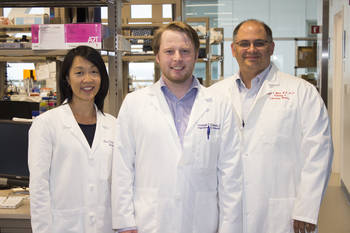30 Jun New Approach May Cure Autoimmune Diseases By Targeting Just Autoantibody Cells
MedicalResearch.com Interview with:

from left to right:
Aimee Payne, MD, PhD – co-senior author
Christoph Ellebrecht, MD – first author
Michael Milone, MD, PhD – co-senior author
Aimee S. Payne, M.D., Ph.D.
Albert M. Kligman Associate Professor of Dermatology
University of Pennsylvania
Philadelphia, PA 19104
MedicalResearch.com: What is the background for this study? What are the main findings?
Dr. Payne: Autoimmunity occurs when the body’s immune system mistakenly attacks itself, instead of foreign viruses and bacteria. The most common way we treat autoimmunity is to suppress the immune system, but that can be dangerous, with risk of serious and even fatal infections. We have developed a method to use the body’s own immune system to specifically kill the disease-causing autoimmune cells, while sparing the “good” immune cells that protect from infection.
If you think about the way we used to treat cancer, we had no way of targeting the cancer cells specifically, so we just targeted all dividing cells, but this approach led to terrible side effects and even death from therapy. Over the last several decades, tremendous advances have been made identifying cell markers and signaling pathways that are specific to cancer cells, which has greatly reduced the toxicity of cancer treatments. Recently, researchers discovered that they could direct the body’s own immune cells to seek out and kill cancer cells, using a so-called “chimeric antigen receptor” or CAR, a breakthrough in medical technology that has cured previously incurable cancers.
We have re-engineered the CAR approach to specifically target the autoantibody-producing cells, by using the disease autoantigen in a “chimeric autoantibody receptor” or CAAR. We are hopeful that this approach might similarly prove to be a breakthrough in autoimmune disease therapy, since the concept can be extended to any autoantibody-mediated disease for which the autoantigen is known.
MedicalResearch.com: What should readers take away from your report?
Dr. Payne: Ideally, the CAAR targeted therapy approach would be a one-time disease treatment that would cure autoantibody-mediated diseases, without the risks of generalized immune suppression. In contrast, our current therapies use chronic immune suppression for the goal of disease control, which can greatly reduce the quality of life for affected patients.
MedicalResearch.com: What recommendations do you have for future research as a result of this study?
Dr. Payne: We are actively seeking to move this technology forward into human clinical trials. Our immediate focus is to use CAAR technology to cure pemphigus in dogs. Dogs are one of the only animals other than humans that naturally develop pemphigus. If we could safely treat and potentially cure pemphigus in dogs, that would be compelling evidence to encourage doctors and patients to enroll for clinical trials of CAAR therapy.
MedicalResearch.com: Thank you for your contribution to the MedicalResearch.com community.
Citation:
Note: Content is Not intended as medical advice. Please consult your health care provider regarding your specific medical condition and questions.
More Medical Research Interviews on MedicalResearch.com.
[wysija_form id=”5″]
Last Updated on July 10, 2016 by Marie Benz MD FAAD
